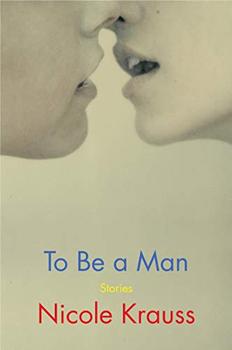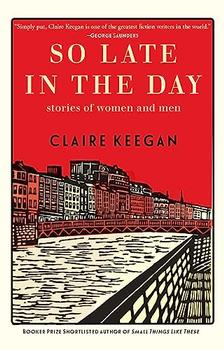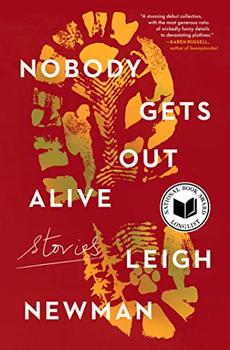Summary | Excerpt | Reviews | Beyond the book | Read-Alikes | Genres & Themes | Author Bio

While, as its title hints, To Be a Man by Nicole Krauss is concerned with masculinity, it renders a variety of characters — heroic and otherwise. Throughout the book, Krauss weaves present-time situations with emotional, ancestral echoes of destruction and deep, unburied grief. The past continues to propel her characters as they find courage to build new lives and relationships; most grapple with the Holocaust's traumatic abyss. The narrative lens consistently blurs elements of time and place, then zooms into scenes that uncover a common humanity.
Krauss often compresses or deepens time and setting in a few sentences. The unnamed, first-person narrator of "Switzerland" recalls a year spent at an international school where she witnessed rebellion and sex vicariously, through the escapades of her friends Marie and Soraya. The story is structured as a time capsule, a snow globe of memories shaken up decades later after the narrator has grown up and become a nostalgic, conflicted mother wondering how to protect her daughter:
One day I saw it: how she looked back at the man in the business suit who stood across the subway car from her, burning a hole through her with his eyes. Her stare was a challenge. […] It was then that Soraya came back to me, and since then I have been what I can only call haunted by her. By her, and by how a person can happen to you and only half a lifetime later does this happening ripen, burst, and deliver itself.
"Future Emergencies" takes place in post-9/11 New York City, an atmosphere that syncs with current pandemic-fueled fears, where the narrator lives with her lover, Victor. As she contemplates her relationship, past, present and possible future are revealed in a single paragraph:
I met Victor in my last year of college. He was the professor of my medieval history class. Victor is French, and so he didn't have any hang-ups about going out with a student. After graduation I moved in with him and got a job giving tours at the Metropolitan Museum. Though the life we live together now feels like the only one I know, there are moments when I still imagine another life, with different things in it. A life with someone who is not Victor, and who is nothing like him.
In other stories, the author explores complicated and multi-generational family dynamics. Retired history professor Brodman, hero of "Zusya on the Roof," battles cancer while mulling over his failures as a father and new role as a grandfather. When Brodman arrives to meet his newborn grandson, he finds himself in a room "already filled to capacity with people who had claims on the child—his daughter, her girlfriend, the homosexual who had contributed the sperm, the homosexual's boyfriend." "I Am Asleep but My Heart is Awake" follows a young narrator whose recently deceased father spent most of his life as an archaeologist in Israel. When the narrator inherits his Tel Aviv apartment (which she was never before invited to visit) she unpacks past secrets. How much remains hidden — Krauss seems to ask — when a father leaves his family? What responsibility do people owe their dead parents, ancestors, vanished centuries of civilization? In "The Husband," Tamar, a therapist in New York, visits her widowed mother in Tel Aviv, and witnesses her brother and his husband with their newborn in a scene that recasts expected notions of parenthood and family: "He stands looking at the baby with his hands on his hips, the empty carrier slung across this shoulder where twenty years ago there hung a machine gun."
In "End Days," usual heroic tropes are subverted through a story that juxtaposes wildfire disaster in California with the destructive, late-life divorce of the narrator Noa's parents, Monica and Leonard. Leonard is an archaeologist, excavating a site in Israel that has burned and been rebuilt many, many times over the past millennia of its existence. Noa, living in California, is summoned on a quest to deliver official court papers to a rabbi because her parents are overseas. However, upon arriving at the rabbi's house, Noa realizes that her quest is not complete. Her journey expands beyond the disruption of her parents' divorce and local wildfires, and she discovers new power to define her choices in life and love.
The title story is told in sections, through which the narrator explores varieties of manhood from several different angles. An Israeli dancer, Rafi, who is also trained as a special forces soldier, provides an example of how traditional roles of both gender and livelihood, in contemporary times, can be incredibly complex. The unnamed Israeli narrator visits her lover, known as the German Boxer, in Berlin, and the two discuss whether they would have been enemies during the war, whether the Boxer would have been a Nazi, a killer. Here, Krauss dives into how generations navigate forward from historic atrocity — carrying guilt, trauma, even wishful thinking. While still in love with the Boxer, the narrator returns home to nurture her young sons, wondering who they will become.
Most of the stories in the book feature unnamed narrators, and overlaps between characters in different stories are occasionally hinted at but not overt. Sometimes my mind drifted when attempting to trace a genealogy between characters. Other readers might also find the lack of specificity confusing. But perhaps this is the author's strategy, to render the narrators more universal. Each story here stands well alone, yet there are shared currents of theme and geography. Recurring themes that might be useful for book club discussions include the Jewish diaspora, contemporary family dynamics, divorce, friendship, love, duty, violence and identity.
The book's high-tensile narratives consistently twist during moments of fate. What are people compelled to do in these moments? What actually happens? These are questions for God, or writers like Krauss, who task contemporary characters with universal dilemmas.
![]() This review was originally published in The BookBrowse Review in January 2021, and has been updated for the
November 2021 edition.
Click here to go to this issue.
This review was originally published in The BookBrowse Review in January 2021, and has been updated for the
November 2021 edition.
Click here to go to this issue.

If you liked To Be a Man, try these:

by Claire Keegan
Published 2023
From Booker Prize Finalist and bestselling author of "pitch perfect" (Boston Globe) Small Things Like These, comes a triptych of stories about love, lust, betrayal, and the ever-intriguing interchanges between women and men.

by Leigh Newman
Published 2023
From the prizewinning, debut fiction author: an exhilarating virtuosic story collection about women navigating the wilds of male-dominated Alaskan society.
Great literature cannot grow from a neglected or impoverished soil...
Click Here to find out who said this, as well as discovering other famous literary quotes!
Your guide toexceptional books
BookBrowse seeks out and recommends the best in contemporary fiction and nonfiction—books that not only engage and entertain but also deepen our understanding of ourselves and the world around us.